MSI Z97 MPower Max AC Review: Overclocking for $260
by Ian Cutress on May 20, 2014 12:00 AM EST- Posted in
- Motherboards
- MSI
- Z97
Real World CPU Benchmarks
Readers of our motherboard review section will have noted the trend in modern motherboards to implement a form of MultiCore Enhancement / Acceleration / Turbo (read our report here) on their motherboards. This does several things – better benchmark results at stock settings (not entirely needed if overclocking is an end-user goal), at the expense of heat and temperature, but also gives in essence an automatic overclock which may be against what the user wants. Our testing methodology is ‘out-of-the-box’, with the latest public BIOS installed and XMP enabled, and thus subject to the whims of this feature. It is ultimately up to the motherboard manufacturer to take this risk – and manufacturers taking risks in the setup is something they do on every product (think C-state settings, USB priority, DPC Latency / monitoring priority, memory subtimings at JEDEC). Processor speed change is part of that risk which is clearly visible, and ultimately if no overclocking is planned, some motherboards will affect how fast that shiny new processor goes and can be an important factor in the purchase.
Rendering – Adobe After Effects CS6: link
Published by Adobe, After Effects is a digital motion graphics, visual effects and compositing software package used in the post-production process of filmmaking and television production. For our benchmark we downloaded a common scene in use on the AE forums for benchmarks and placed it under our own circumstances for a repeatable benchmark. We generate 152 frames of the scene and present the time to do so based purely on CPU calculations.
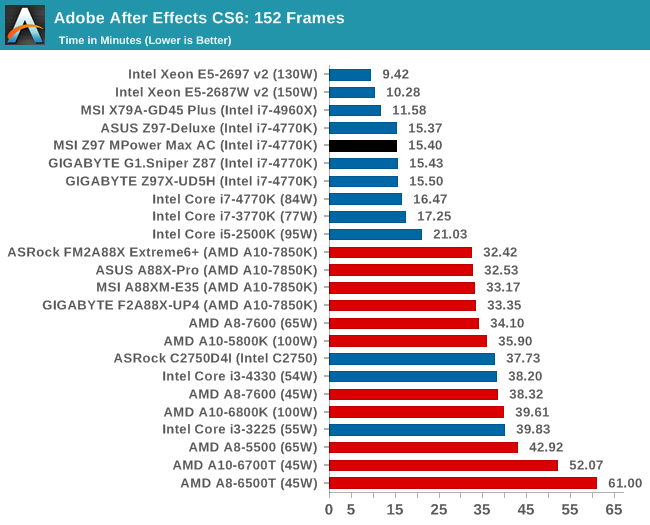
Compression – WinRAR 5.0.1: link
Our WinRAR test from 2013 is updated to the latest version of WinRAR at the start of 2014. We compress a set of 2867 files across 320 folders totaling 1.52 GB in size – 95% of these files are small typical website files, and the rest (90% of the size) are small 30 second 720p videos.
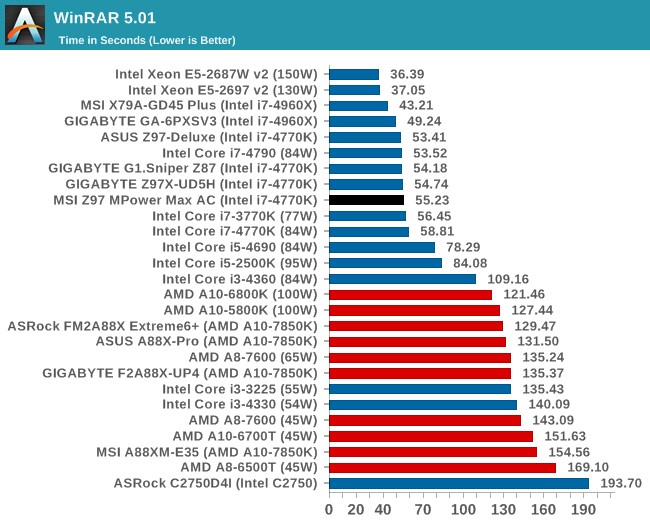
Image Manipulation – FastStone Image Viewer 4.9: link
Similarly to WinRAR, the FastStone test us updated for 2014 to the latest version. FastStone is the program I use to perform quick or bulk actions on images, such as resizing, adjusting for color and cropping. In our test we take a series of 170 images in various sizes and formats and convert them all into 640x480 .gif files, maintaining the aspect ratio. FastStone does not use multithreading for this test, and thus single threaded performance is often the winner.
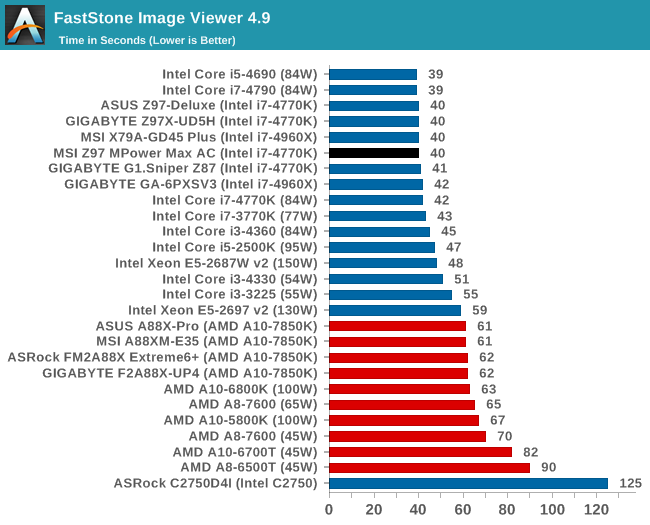
Video Conversion – Xilisoft Video Converter 7: link
The XVC test I normally do is updated to the full version of the software, and this time a different test as well. Here we take two different videos: a double UHD (3840x4320) clip of 10 minutes and a 640x266 DVD rip of a 2h20 film and convert both to iPod suitable formats. The reasoning here is simple – when frames are small enough to fit into memory, the algorithm has more chance to apply work between threads and process the video quicker. Results shown are in seconds and time taken to encode.
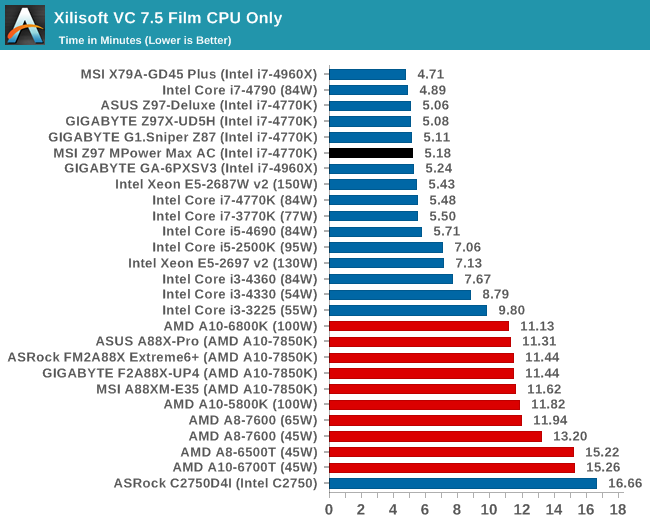
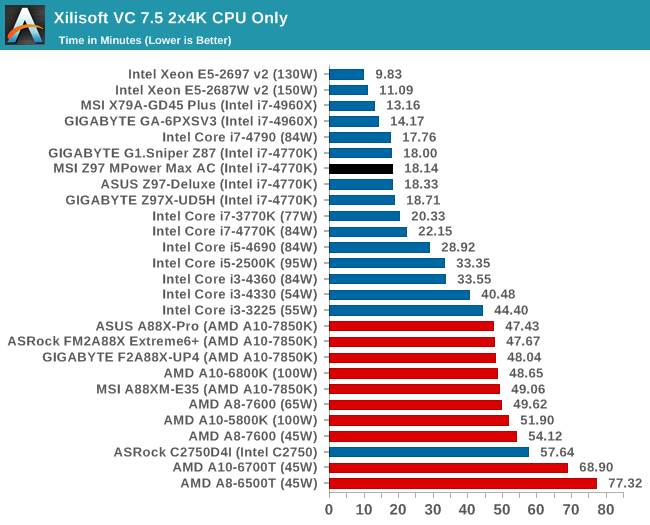
Video Conversion – Handbrake v0.9.9: link
Handbrake is a media conversion tool that was initially designed to help DVD ISOs and Video CDs into more common video formats. The principle today is still the same, primarily as an output for H.264 + AAC/MP3 audio within an MKV container. In our test we use the same videos as in the Xilisoft test, and results are given in frames per second.
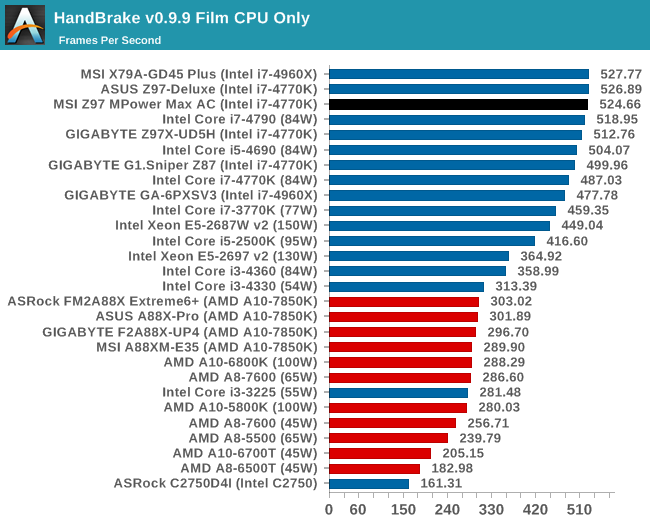
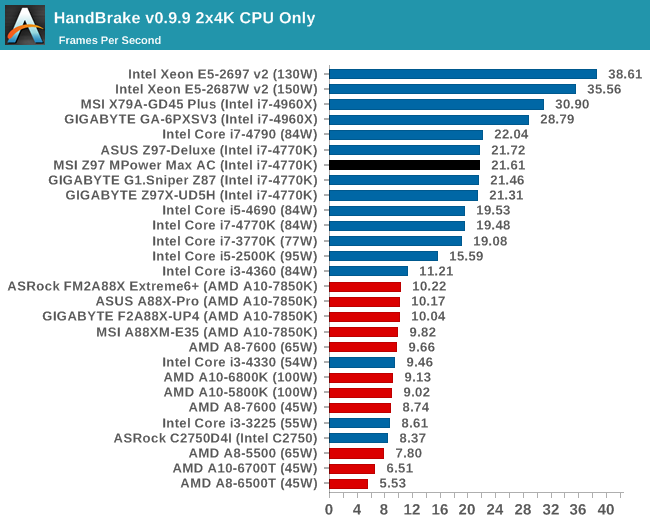
Rendering – PovRay 3.7: link
The Persistence of Vision RayTracer, or PovRay, is a freeware package for as the name suggests, ray tracing. It is a pure renderer, rather than modeling software, but the latest beta version contains a handy benchmark for stressing all processing threads on a platform. We have been using this test in motherboard reviews to test memory stability at various CPU speeds to good effect – if it passes the test, the IMC in the CPU is stable for a given CPU speed. As a CPU test, it runs for approximately 2-3 minutes on high end platforms.
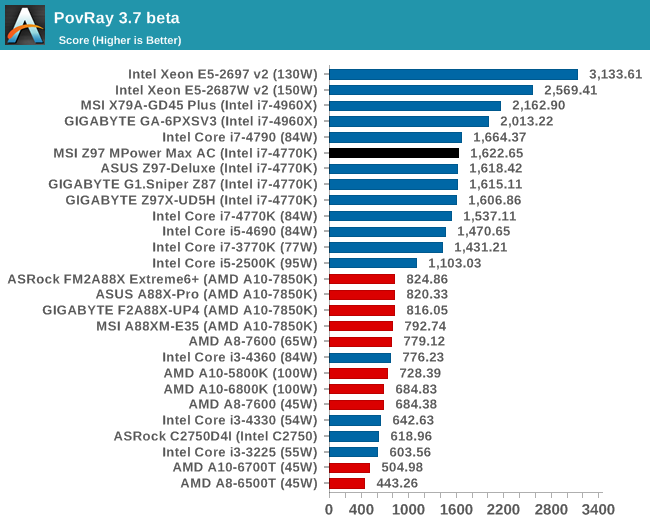










19 Comments
View All Comments
Nintendo Maniac 64 - Tuesday, May 20, 2014 - link
Can I just say that it still feels weird to see AnandTech benching Dolphin? I mean, I know that I was the guy that sent the email about the benchmark, but emulation just seemed like one of those more "hush hush" things you just didn't talk much about...Also, you've been misspelling "boost" as "post" in every single article with the Dolphin benchmark - "provided a significant post to emulator performance". You may want to fix your typo from wherever you're copy & pasting that text from, not just fixing it in the article.
Ian Cutress - Tuesday, May 20, 2014 - link
Hi NM64, yeah that typo is a carry over from my custom review template. I've fixed in the original now. It's good to have an emulation in general, as not all emulation is perhaps licensed games.silenceisgolden - Tuesday, May 20, 2014 - link
Thank goodness MSI is listening to feedback about connectivity. I wouldn't want a thing changed about this motherboard, and if I wasn't waiting for the new -E line I would upgrade to this. It really is refreshing to see a brand not get caught in the SATA Express hype, cater to old PCI, and realize that USB3 is here in full.Galatian - Tuesday, May 20, 2014 - link
I beg to disagree but to each their own. Personally I feel somewhat letdown by Z97. We have M.2 and SATA Express ports but they are already outdated because they don't use 4 x PCIe 2.0 lanes as they could. Instead they opt out for multiple SATA and USB ports. Realistically: How many of those ports does one need? Me as a gamer I have one SSD in my case and a keyboard, mouse and xbox controller receiver connected to USB. That's all.Morawka - Tuesday, May 20, 2014 - link
the problem is not enough lanes in haswell and Z87/Z97. 2X SLI is already running at 8X 8X. Besides, what they are currently using on this board is enough to saturate what the M.2 SSD's are capable of.reininop - Tuesday, May 20, 2014 - link
Well, from the perspective of another gamer, that also uses his system as a all-purpose system as well, I have a keyboard, mouse, printer, xbox wireless receiver, wireless adapter, headphones, charger for my phone, charger for headphones, extension to monitor usb ports, and maybe one other thing. I'm sure there are others with even more needs.Morawka - Tuesday, May 20, 2014 - link
Metro Last Light Inspired Box?theduckofdeath - Wednesday, May 21, 2014 - link
I was thinking the same :3r3loaded - Tuesday, May 20, 2014 - link
Is Asus coming out with a Maximus VII Formula? It'd be great to compare that with this board as MSI have a very strong competitor here. Either way, it bodes well for the Haswell-E equivalent of this board.Galatian - Tuesday, May 20, 2014 - link
ASUS hasn't introduce their entire line-up for Z97 yet. They are probably waiting for the Devil Canyon chips.